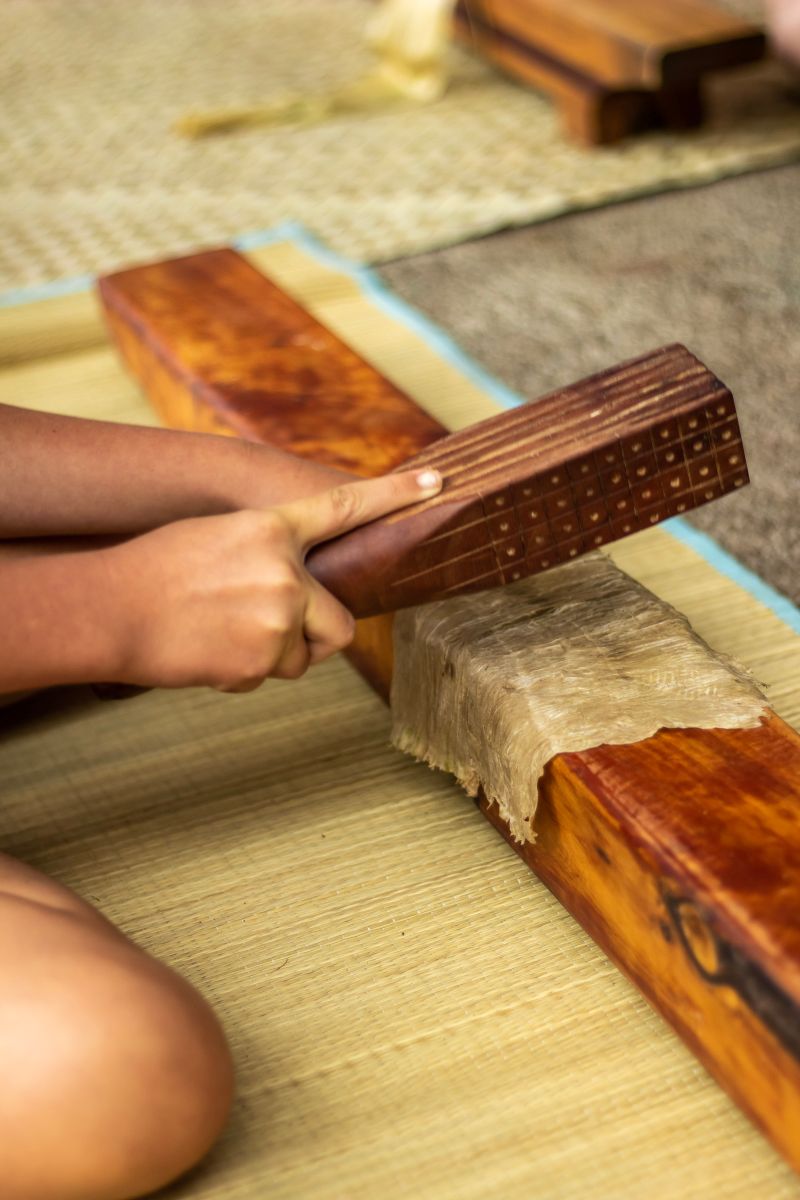The Art of Kapa Making
Description

Instructor: Puakea Forester
Schedule:
Saturday & Sundays from 10:00 AM - 4:00 PM
September 18 & 19
October 16 & 17
January 29 & 30
# of Sessions: 6
Location: DMAC Lawn
Level/Prerequisite: Beginner
Tuition/Admission: Member $465, Non-Member $580
Supply Fee: $635
Payment Plan: The Donkey Mill Art Center recognizes that this is a high priced workshop and will be offering an interest-free payment plan to students. The payment plan will divide the tuition and supply fee total into four payments. Participants that are in need of a payment plan will call 808-322-3362 or email info@donkeymillartcneter to make arrangements with Kasey Lindley. Please see details below:
|
Due Date |
Due Date |
Due Date |
Due Date |
|
|
Member, $275 per month |
Sept 15 |
Oct 15 |
Dec 15 |
Jan 15 |
|
Non-Member, $303.75 per month |
Sep 15 |
Oct 15 |
Dec 15 |
Jan 15 |
Kapa Aloha ʻĀina is an unhurried sense of wholeness, connection, and belonging to place and each other through the many disciplined facets of ka hana kapa—the making of Hawaiian barkcloth.
For the student, the teacher, the artist, Kapa Aloha ʻĀina is a complete educational program, providing all the tools necessary to hoʻomau, perpetuate Hawaiiʻs beautiful and loving practice of making kapa worthy enough for any milestone that will stay with you and your ʻohana for generations.
These six day intensive (three weekends), is designed to scaffold following the natural progression of kapa making as a circular system from ʻāina to ʻāina. Nearly all materials provided are locally tended to and gathered sparingly from the land and sea. *
In this kapa series, students will learn:
- History, mythology, creations stories, mele and the legacy of kapa making
- Tending to your fiber and dye plants by nā kaulana mahina (phases of the moon)
- Protocols for when, what and how much to gather.
- What types of medium and hardwoods to choose for carving
- Several hard wood carving techniques and their tools
- Beating kapa, beating tapa the long and short methods
- How kapa is softened, burnished and prepared for printing.
- Processing local and invasive fiber plants for weaving, twisting, and lashing cordage
- How to transform plant & earth pigments into dyes, then inks and even oil and watercolor paints
- Hawaiian specific design work, layouts, and printing techniques.
Instructor bio:
Puakea Forester was born in Kahuku, O‘ahu to a woodworker, and an arts and religions professor at BYU-Hawaii. Puakea attended Ka‘a‘awa Elementary School where her kumu hula (teacher) Aunty Kawai Aona-Ueoka, instilled in her a love for hula, and a kuleana (responsibility) in making the kapa.
“There is profound mana held in the memories of our childhood. One such memory was of being a young girl in the mid 80ʻs, watching my kumu singing with the rustling leaves of her wauke as she plucked the side shoots to make for good clean kapa, caressing them, as you would tending to your loved ones.”
When a child bares witness to those in their community tending reciprocal, loving relations between themselves and ʻāina, they see where they too have a familial place amongst the natural world - thereby reducing the impact of colonizing extractive mentalities - resulting in a whole and meaningful sense of self to continue the work of healing and mending broken relationships with nature for our kūpuna (ancestors) & our mo’opuna (grandchildren). Puakea firmly grounds her life work centered upon these principles. With almost 25 years of teaching ages 2-101, Puakea brings with her a bold and joyful background in theater for social change, global & indigenous women's studies, ethnobotany, and fiber arts.
SYLLABUS
Session 1: Niho ʻoki & Waʻu - Harvesting and their Tools
Session 2: Hohoa (Round Beater) & Kuku Kapa
Session 3: Iʻe Kuku (4-Sided Kapa Beater)
Session 4: Kua Laʻau (Wood Anvil) & Kuku Kapa e
Session 5: `Ohe Kāpala: Symbols & Designs of Hawaiian Kapa
Session 6: Dyes, Inks, & Paints from Common & Invasive Plants
Included in the supply fee: Total $635.00
Session 1 art kit ($130)
1 beautiful large black lip pearl, shaped, sharpened, and drilled w/ the appropriate holes for lashing.
1 piece of young niu (coconut) fiber that is found only in the highest part of the tree (mahalo to Island Treescapes) to cushion the palm while in use.
1 generous length of Hau, Miaʻa, or Malokia to twist into kaula, (cordage)
1.5ʻʻ Niho Mano (shark tooth) tiger shark Local kiln dried Ohiʻa wood handles cut and ready for shaping.
5-7 ft Wauke tree
Session 2 Art Kit 2 ($95)
Finished Shaped & Polished hohoa (round beater made with local sourced hardwoods) with local beeswax & kukui oil ready for carving
carving tools, 3 ft wauke moʻomoʻo (without bark)
Session 3 ART KIT ($65)
1 Iʻe kuku Blank -Hand lathed local and sustainably sourced hardwood beater finished with local beeswax & kukui oil
Session 4 ART KIT ($230)
Hollowed out and shaped (3-5”x 22-26”) hard to medium density Kua laʻau (Wood Anvil)
5-7 ft wauke tree
Session 5 ART KIT ($50)
2 ʻOhe Kapala blanks
1 round ʻOhe Kapala blanks
1 practice block 2” x ½” x 4”
1 Carbon transfer sheet
Session 6 ART KIT ($65)
Handouts and reference material for natural dyes recipes and stamping
Watercolor cards
Muslin Fabric (cellulose)
Silk Fabric (Protein)
What students should bring:
Sketchbook and pen or pencil
Lunch, snack and something to drink
Mask
Towel
2 Laʻi (Ti leaf)
Empty jars to take home dyes, mordant / tannis and paints
.png)